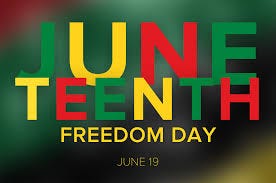JUNETEENTH: THE 19TH LETTER
This text was written for a performance by the Burnt Sugar Arkestra at Lincoln Center on Juneteenth 2023
The text below was comissioned by Jared Michael Nickerson of the Burnt Sugar Arkestra to accompany a live performance by the ensemble at Lincoln Center on June 17th as part of a Juneteeth event in New York. There will be live music underneath a reading by the actress Cassandra Freeman. Once I have the music I will post a link. Until then here’s my rather sour look back at the history of Juneteenth based on numerology with a paraphrase of the great Langston Hughes.
The 19th letter of the alphabet is a dance of two curls that slides through history, a letter both sweet and sour. It is the starting letter of words soft, silly and sad. The 19th letter is the first in slavery that most sinister and savage institution that symbolizes the sickness in our national soul.
S is the 19th letter. For us 19 will always be attached to the modifier Covid, but for generations of oppressed Americans it was a number transformed.
On June 19th, 1865, two thousand U.S. Army troops arrived at the beach town of Galveston, Texas. If you Google "Visit Galveston," the city is praised for its "32 miles of beaches and chic boutiques" and as a "quaint Gulf Coast barrier island."
But on that site there's nary a mention of slavery, the 19th letter, or that it was two and a half years after the signing of the Emancipation Proclamation that the enslaved residents were told that slavery had been outlawed. In the heart of Texas - the land of civil rights act signing LBJ, civil rights denying Ted Cruz and the late heroic Barbara Jordan - 250,000 men, women and children had toiled for free throughout that vast state, because life altering news traveled mighty slow to the Lone Star state.
For decades African-Americans in Texas celebrated liberation or, at least, the illusion of it that passes for freedom in many parts of this nation. That celebration, born of delay, has grown more powerful with time. So what we rejoice in here today is not information denied, but black folks ability to turn that denial into a party. We turned that 19th letter into Juneteenth.
The 19th letter is the first in "servitude," a word once modified by another word "indentured," which described the status of thousands of men and women discarded into "the new world" to pay off debt. Unlike the enslaved, those in indentured servitude had a ticking clock of four to seven years before being granted their release. These folks - the peasants and farmers and reprobates of Europe - would become the red neck backbone of working class America and so many, like the MAGA pawns of today, became addicted to white supremacy, main lining a fictional narrative of natural superiority that left them deaf, dumb and blind to capitalism's grand hustle. This particular narcotic left them strung out on hate when Juneteenth finally came to Texas.
Today news is instantaneous -- a bombing, a Presidential declaration, a new dance sensation -- are posted, streamed and dissected in seconds just as the news blast of information enters your dome.
But in the 1860s news was a letter in a Pony Express pouch, a bag in a rail road coach or the ticking of a telegraph wire. News arrived by word of mouth, in crumpled newsprint or via an ordinance posted on a church door. So it was with General Order #3. Potsed on the Negro Church of Galvaston on the 19th of June 1865.
General Ordinance #3 read:
"The people of Texas are informed that, in accordance with a proclamation from the Executive of the United States, all slaves are free. This involves an absolute equality of personal rights and rights of property between former masters and slaves, and the connection heretofore existing between them becomes that between employer and hired labor. The freedmen are advised to remain quietly at their present homes and work for wages. They are informed that they will not be allowed to collect at military posts and that they will not be supported in idleness either there or elsewhere."
Yes, the word “free” is in the very first sentence of the ordinance. But the freedom announced here kept the newly freed in the employment of their previous owner and, implicit that freedom will be policed. “Idleness,” which some would argue is the trueist expression of personal freedom, would be, and has always has been in the country, monitored.
So yes, Juneteeth is a celebration, but it is also a testament to the limits of freedom in these United States. It means fully, unfettered freedom was then, and remains now, a dream deferred and what happens to a dream deferred and deferred and deferred and deferred….



